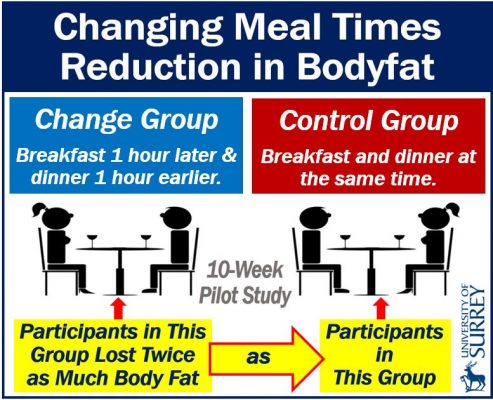If you change your meal times, especially breakfast and dinner, you might reduce your body fat, researchers found. Researchers at the University of Surrey investigated what impact changing meal times might have on dietary intake. They also investigated the possible effects on blood risk markers for diabetes and heart diseases as well as body composition.
Dr. Jonathan Johnston and colleagues wrote about their new pilot study in the Journal of Nutritional Sciences (citation below).
Dr. Johnston’s colleagues and co-authors were Rona Antoni, Tracey M. Robertson, and M. Denise Robertson. They all work at the Faculty of Health and Medical Sciences, University of Surrey, Guildford, UK.
Pilot studies are relatively small studies. They aim to determine whether crucial components of a main study will be possible. A randomized controlled trial, for example, is a ‘main’ study.
In this study, ‘dinner’ means ‘supper,’ i.e., the last meal of the day.

Meal times – a 10-week study
The study on ‘time-restricted feeding‘ lasted ten weeks. Time-restricted feeding is a form of intermittent fasting.
The researchers split the participants into two groups:
– Participants delayed their breakfast by ninety minutes. They also had their dinner ninety minutes earlier.
– Participants’ meal times remained the same.
During the trial, participants provided blood samples. They also completed diet diaries before and after the 10-week experiment. Immediately after the study, they completed a feedback questionnaire.
In this study, unlike previous ones, participants could eat freely. In other words, the researchers did not ask them to stick to a strict diet. However, they could only eat during specific eating windows.
The authors wanted to determine whether this type of diet or lifestyle was easy to follow. In other words, would it conveniently fit into their everyday lives?
Effect of changing meal times
The authors found that the participants who changed their meal times lost more fat. In fact, they lost, on average, twice as much body fat as those who did not change their meal times. We refer to the group that did not change breakfast and dinner times as the ‘control group.’
If these findings can be repeated in larger studies, there is potential for time-restricted feeding. The meal-time change in people’s daily routines could have broad health benefits.
How much did people eat?
Although the researchers did not restrict what the participants could eat, one group ate less than the other. Those in the group that changed meal times consumed less food overall than participants in the control group.
According to the questionnaire, 57% of participants in the different meal times group reported that they ate less. They ate less either because of a reduction in appetite, or there were fewer eating opportunities. They also reported that they snacked less, especially in the evenings.
The authors don’t yet know whether the longer fasting periods contributed to the body fat loss. If you have dinner one hour earlier and breakfast one hour later, you are fasting for two hours longer.
Changing meal times and people’s lifestyles
The researchers also tried to determine whether fasting diets are compatible with our everyday lives. They wanted to determine whether fasting diets were something people could commit to over the long term.
According to the questionnaire, fifty-seven percent of participants said they couldn’t keep up the meal times. In other words, after the 10-week study period, they could not continue breakfasting later and having dinner earlier. They said they couldn’t do this because of their incompatibility with social and family life.
Forty-three percent of participants, on the other hand, said they would consider it if the eating times could be more flexible.
Fasting diets are difficult to follow
Dr. Johnston, Reader in Chronobiology and Integrative Physiology at the University of Surrey, said regarding the pilot study:
“Although this study is small, it has provided us with invaluable insight into how slight alterations to our meal times can have benefits to our bodies. Reduction in body fat lessens our chances of developing obesity and related diseases, so is vital in improving our overall health.”
“However, as we have seen with these participants, fasting diets are difficult to follow and may not always be compatible with family and social life. We, therefore, need to make sure they are flexible and conducive to real life, as the potential benefits of such diets are clear to see.”
“We are now going to use these preliminary findings to design larger, more comprehensive studies of time-restricted feeding.”
Citation
“A pilot feasibility study exploring the effects of a moderate time-restricted feeding intervention on energy intake, adiposity and metabolic physiology in free-living human subjects,” Rona Antoni, Tracey M. Robertson, M. Denise Robertson, and Jonathan D. Johnston. Journal of Nutritional Science. https://doi.org/10.1017/jns.2018.13. Published online: 30 August 2018.
